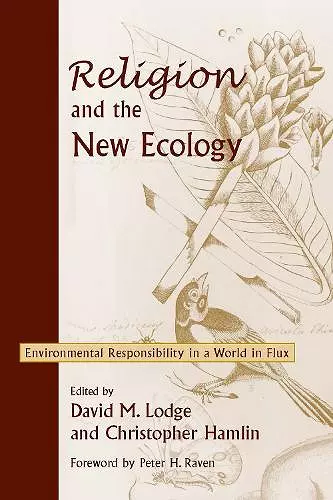Religion and the New Ecology
Environmental Responsibility in a World in Flux
Format:Paperback
Publisher:University of Notre Dame Press
Published:30th Sep '06
Currently unavailable, and unfortunately no date known when it will be back

For many years, ecologists and the environmentalists who looked to ecology for authority depicted a dichotomy between a pristine, stable nature and disruptive human activity. Most contemporary ecologists, however, conceive of nature as undergoing continual change and find that "flux of nature" is a more accurate and fruitful metaphor than "balance of nature."
The contributors to this volume address how this new paradigm fits into the broader history of ecological science and the cultural history of the West and, in particular, how environmental ethics and ecotheology should respond to it. Their discussions ask us to reconsider the intellectual foundations on which theories of human responsibility to nature are built. The provisional answer that develops throughout the book is to reintegrate scientific understanding of nature and human values, two realms of thought severed by intellectual and cultural forces during the last two centuries. Religious reflection and practice point the way toward a new humility in making the tough decisions and trade-offs that will always characterize environmental management.
Timely and challenging, the essays suggest avenues toward a new framework for interdisciplinary conversation among theologians, philosophers, historians, and environmental ethicists.
Contributors: David M. Lodge, Christopher Hamlin, Elspeth Whitney, Mark Stoll, Eugene Cittadino, Kyle S. Van Houtan, Stuart L. Pimm, Gary E. Belovsky, Peter S. White, Patricia A. Fleming, John F. Haught, and Larry Rasmussen.
“The book reflects the conviction that we must establish significant coherence between our historical, scientific, and religious understandings of nature if we are to effectively address current and emerging environmental problems . . . the editors effectively frame the overarching problems and the essays are serious, although still accessible to readers from various backgrounds.” —The Quarterly Review of Biology
“Christians in environmental studies can use this book as an additional source of opinions on moral and ethical questions.” —Perspectives on Science and Christian Faith
“… the authors firmly believe that religion has much to offer to modern environmentalism. They pragmatically argue that we need to engage with American Christians specifically, simply because of their prominence. More important, the authors genuinely believe that Christianity has the potential to contribute to a renewed environmental ethic; they unanimously dismiss Lynn White’s infamous thesis that Christianity is essentially the cause of ecological degradation.” — BioScience
“Contributors to this volume address the question of how the new paradigm of continual change in ecology ('flux in nature') fits into the broader history of ecological science and the cultural history of the West, and, in particular, how environmental ethics and eco-theology should respond.” —Interdisciplinary Studies in Literature and Environment
"Everything on Earth is becoming unbalanced—escalating populations and consumption, global warming, extinction, troubling ecosystems that by nature are fluxing, evolving, often disturbed, even chaotic. What can and ought we conserve, preserve, sustain on this planet in jeopardy? Here science and religion join in urgent dialogue, a seminal search for answers as we face an open future, with promise and peril." —Holmes Rolston, III, University Distinguished Professor and Professor of Philosophy, Colorado State University
"Ecology has experienced a major paradigm shift over the last half of the twentieth century. This shift requires major rethinking of the relation of religion and environmental ethics to ecology because our scientific understanding of the nature side of that relationship has changed. This book is the first, to my knowledge, that is meeting this challenge head on, and it is doing so in an exemplary way." —J. Baird Callicott, University of North Texas
ISBN: 9780268034047
Dimensions: 229mm x 152mm x 19mm
Weight: unknown
340 pages